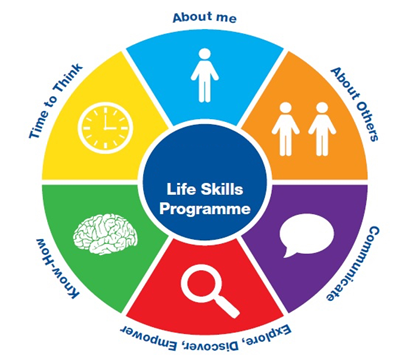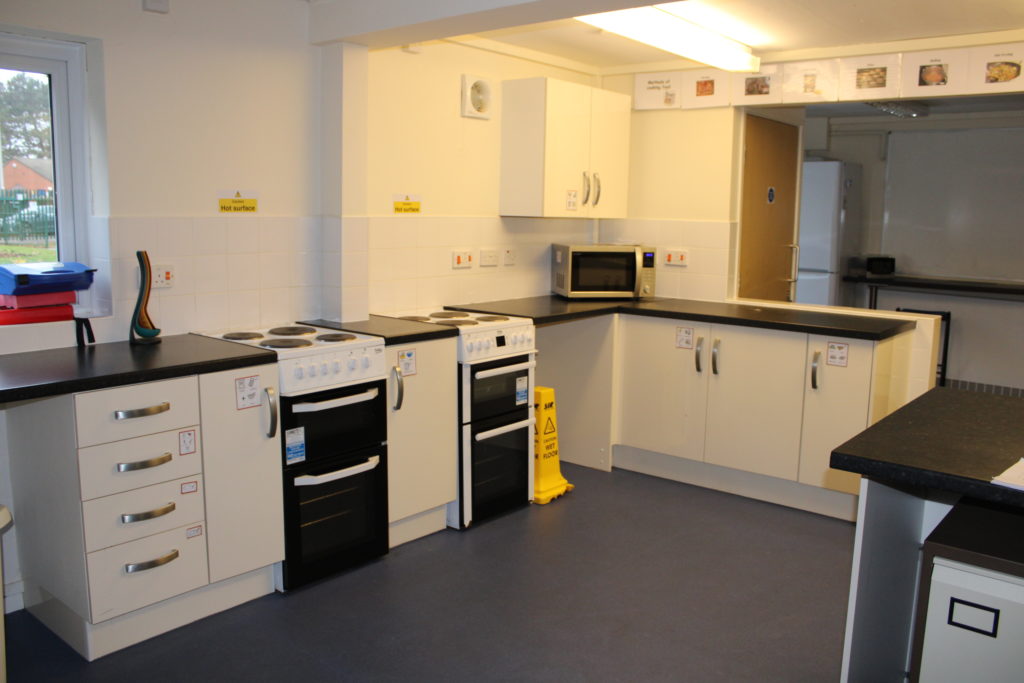
The aim of Life Skills at Queensbury School is to equip students with the transferable skills needed to be able to have fulfilling lives, whilst at school and in the future. For our students achieving independence is an important part of the journey into adulthood. We offer preparation and guidance, so our students can develop and apply in the real world the essential skills required in independent living such as knowing ourselves, looking after myself and others, making meals, communicating and many more. Life Skills curriculum gives the opportunity to develop skills through the experience of daily activities both on and offsite. We encourage a strong liaison with families to ensure the teaching of life skills span across the students` day including before and after school. Our students can build on the foundation of Skills for Life and Work qualifications, to help them perform at work and progress with confidence in the future.

| KS5 | Intent (Why are we doing it) | Implement (How we are going to do it) | Impact (What we want to see and develop) |
|---|---|---|---|
| Discovery | We encourage our students to discover and recognize the skills required for independent living. Students gain skills in areas including independent living, personal development, and preparing for work, enabling greater awareness of everyday living challenges. This includes the development of independence and life skills, a strong sense of self, communication and interaction with others, as well as confidence, resilience, and understanding of the world around them. We ensure our Discovery students have access to learning within the community and provide opportunities to practice these essential skills on many occasions, with the aim of embedding them as part of the everyday living process. | Students are provided with an opportunity to gain skills and understanding so that they can take part in operating independently in life and learning. They learn through different tasks, units that cover: communication skills, general skills to improve independent living, employability skills. We enable learners to have an understanding of a working environment. | We would like to prepare our students to recognise how to live their lives as much independently as possible by gaining skills in cooking for self, looking after a home, staying safe, recognising services in the local community. We would like them to develop skills such as teamwork, communication with others, how to dress and behave, how to follow instructions. |
| Explorer | We encourage students to learn how to recognize the development of knowledge and skills to operate independently and effectively in life, learning, and work. We ensure students gain appropriate and relevant education required for living, learning, and working within the community; recognize personal growth and engagement in learning; develop transferable life skills; and improve their life chances. Students are supported in building self-belief and confidence, developing resilience, and nurturing aspiration to achieve. They enhance their preparation for the world of work and strengthen their communication and interaction with others. We help our students to build confidence in their own abilities and increase their knowledge of procedures to access facilities and services in the community. | Students participate in activities in and outside of the school to improve skills required for living independently and operating independently in life, learning and work. Our students are helped to make informed choices and take part in activities available in the Community and increase learners’ chances of living independently and safely in own homes. | We would like to prepare our students to learn how to live independently by gaining skills in cooking for self, looking after a home, managing a budget, staying safe, gain confidence to access services in the local community, gain transferable skills such as teamwork, communication with others, literacy and numeracy skills and help to develop personal skills, such as how to follow instructions and how to apply for a job or a course |
| Navigator | Our students learn how to live independently and develop problem-solving skills, including addressing issues related to saving money, banking, and budgeting. We provide opportunities for learners to build skills in areas such as employability, understanding own learning styles and personal development, giving them the chance to explore vocational areas that inform their career and employment choices. We help our Navigator learners to gain the skills required in the real world of work. Students are encouraged to develop ambition and self-belief, practice teamwork, and grow in confidence, resilience, and courage, enabling them to face challenges and thrive in diverse environments, in preparation for adulthood. | Students` learning is based on qualification which consists of a range of units. Students learn through discussions, working with others and the practical tasks such as preparing events, researching, working as a part of a group. Our learners undertake a wide range of work-related learning challenges including writing CVs and covering letters, finding out about jobs they are interested in, making plans for the future, whether this is further study or employment, and participating in a mock interview. | We would like our students to gain greater understanding of careers and courses available to them. To be able to implement gained skills and knowledge in everyday living and in the world of work. We would like them to become confident and independent young people who are able to make the right choices, to use and apply their skills consistently in their daily lives. |
| Quest | Students learn to identify and respond to their own needs and different forms of assertiveness in life, including the ability to confidently say "no" to avoid risky or unsafe situations. Through role play, they explore how to keep themselves safe and engage in discussions that build social understanding and resilience. Our Quest learners develop key skills such as interacting with others, understanding the world, independence, and communication — all linked to life skills, self-awareness, and their understanding of the world around them. We ensure our Quest students have access to learning within the community and provide opportunities to practice these essential skills on many occasions, with the aim of embedding them as part of the everyday living process. | Students explore and develop their understanding of how to keep themselves and others safe both in school and in the wider community. | Students discuss their thoughts and ideas in small groups. Through basic role plays they reflect on the world around them and the dangerous that could present in different situations. |

Delivery of Life Skills at Queensbury School:
How we make Life Skills subjects interesting?
- Teaching across Life Skills follows a curriculum map designed to develop key skills in our pupils which encourage them to think critically and prepare them for the wider world
- The curriculum is designed in such a way as to support pupils through challenges facing adults in everyday living, how to cope with these and how to make decisions in regards to their future.
- Dedicated staff making learning interesting and practical as much as possible;
- Topics carefully chosen and tailored to students needs and interests, related to everyday living;
- Offsite education- Community Access lessons, visiting places such as Birmingham Library, city centre, Job Centres, museums, cafes;
- Travel training – close liaison to Life skills targets to increase students` independence;
- Cooking – real life experience to prepare and taste different foods;
- Close liaison with parents to extend learning in the classroom by practicing gained skills at home;
- Taking part in events such as Road Safety week, healthy tuck shop;
- Learning through experience – vocational education studies- Hair & Beauty, Catering, Painting &decorating, Office skills, Household skills, Horticulture;
- Visiting school`s allotment, looking after 6th form veggies garden;
- Close link to Career`s advisor, link to Career`s programmes and resources;
- Visitors invited to employability lessons;
- Preparing students for works experience
- Taking part in raising money for different charities, Food bank,
- Taking part in organising events such as Coffee mornings;
